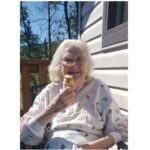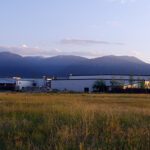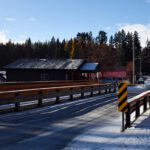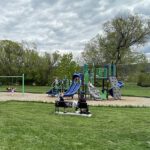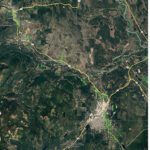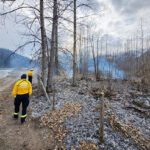Home »

B.C. unveils next steps of COVID-19 immunization plan
More than 400,000 people in British Columbia will be immunized from March to early April as the province moves into Phase 2 of the largest immunization rollout in B.C.’s history, states a joint Office of the Premier and Ministry of Health media release issued this morning (March 1).
“At every step of the way, we are putting the health and safety of British Columbians first,” said Premier John Horgan. “B.C. was one of the first provinces to lay out our vaccine plan, and now we’re moving to Phase 2 to reach even more of our seniors and Elders. We’re getting vaccine into arms as fast as we can given early supply delays from manufacturers, and we’re seeing it start to make a difference for people and their communities throughout our province.”
Those in Phase 2 receiving their first vaccine dose in March and early April include:
* seniors and high-risk people residing in independent living and seniors’ supportive housing (including staff);
* home-care support clients and staff;
* Indigenous (First Nations, Métis, Inuit) peoples born in or before 1956 (65 years and older); and
* seniors born in or before 1941 (80 years and older).
“The pandemic has been incredibly difficult for all of us, and I’m proud of our health-care workers who continue to work around the clock to safely and efficiently deliver the vaccine to British Columbians throughout the province,” said Adrian Dix, Minister of Health. “We are all eager to put the pandemic behind us, and today marks a major step towards keeping British Columbians safe from COVID-19.”
On March 1, first-dose immunizations begin for those living and working in independent living centres and seniors’ supportive housing, as well as home-care support clients and staff. Health authorities will directly contact those in this priority group to book appointments – no need to call.
Beginning March 8, 2021, seniors aged 80+ and Indigenous peoples aged 65+ who are not living in independent living or seniors’ supportive housing can make one call to book their appointment through their local health authority call centre according to a staggered schedule. This is to avoid long waits and system overload.
Immunization clinic locations will be confirmed at time of booking, with vaccinations starting as early as March 15:
* March 8: Seniors born in or before 1931 (90 years+) and Indigenous people born in or before 1956 (65 years+) may call to book their vaccine appointment;
* March 15: Seniors born in or before 1936 (85 years+) may call to book their vaccine appointment; and
* March 22: Seniors born in or before 1941 (80 years+) may call to book their vaccine appointment.
“This immunization process is a massive undertaking and I thank the regional health authorities, the thousands of health-care workers and medical staff, our colleagues in the Ministry of Health and the many community partners who help us to deliver care and who have been working tirelessly throughout this pandemic for their dedication and support,” said Dr. Penny Ballem, executive lead for B.C.’s immunization plan. “Phase 2 is right on schedule, and we are working closely with each of the regional health authorities to make sure that they have the tools and resources needed to safely and efficiently book appointments.”
Health authority contact information, complete call-in schedules, hours of operations and step-by-step instructions on how to call to book an appointment for yourself, for a family member, for a friend or neighbour will be available on March 8, here: www.gov.bc.ca/bcseniorsfirst
“We can now see the light at the end of what has been a difficult and challenging time for us all. To get us through, we need to continue to work together and support each other,” said Dr. Bonnie Henry, provincial health officer. “We are working hard each and every day to make sure that everyone who wants a vaccine gets one, and my new provincial health officer order significantly expands the range of health professions and occupations who can support our immunization clinics, including dentists, midwives, pharmacy technicians, paramedics, firefighters and retired nurses.”
For health professionals who want to sign up to support B.C.’s immunization efforts as immunizers.
Immunizing other priority groups identified in Phase 2, many of whom have already received their first dose, is also underway, including:
* Indigenous communities, Indigenous Elders, hospital staff, community general practitioners and medical specialists not immunized in Phase 1;
* vulnerable populations living and working in select congregate settings; and
* staff in community home support and nursing services for seniors.
In mid-April, Phase 3 will begin mass vaccination of people aged 79 to 60 years, and people aged 16+ who are extremely clinically vulnerable, at community immunization clinics throughout B.C. Mobile clinics will be available in some rural communities and for people who are homebound due to mobility issues.
In Phase 3, British Columbians will register and book their appointments to receive their first and second doses of COVID-19 vaccine through an online registration tool.
People born between 1942 and 1946 (ages 79-75), and Indigenous peoples born between the years of 1956 and 1960 (ages 64-60), will be able to register for an appointment online or by phone by March 31.
As of Feb. 26 252,373 people in B.C. have received their first dose of the COVID-19 vaccine, including 73,808 who have received their second dose.
On March 22, seniors born in or before 1941 (80 years+) may call to book their vaccine appointment.
The call centre will ask for:
* legal name;
* date of birth;
* postal code;
* personal health number (PHN) from the back of B.C. driver’s licences or BC services cards, and
* current contact information, including an email address you or your family checks regularly or a phone number that can receive text messages.
Call centres will never ask people for financial information, including credit card details.
Regional health authority call centre hours are open from 7 a.m. to 7 p.m., seven days a week.
Number to call for Interior Health: 1-877-740-7747
Phase 4 timeline: July to September.
People aged 59 to 18, in five-year increments: (D1 = first dose/D2 = second dose)
* Aged 59 to 55; D1: July/D2: August;
* Aged 54 to 50; D1: July/D2: August;
* Aged 49 to 45; D1: July/D2: August;
* Aged 44 to 40; D1: July/D2: August;
* Aged 39 to 35; D1: July or August/D2: August or September;
* Aged 34 to 30; D1: August/D2: September;
* Aged 29 to 25; D1: August or September/D2: September;
* Aged 24 to 18; D1/D2: September.
Immunization for clinically extremely vulnerable Individuals
British Columbians aged 69 to 16 with the following conditions will be eligible for earlier immunization in Phase 3 as they are deemed clinically extremely vulnerable:
* solid organ transplant recipients;
* people with specific cancers;
* people with cancer who are undergoing active chemotherapy;
* people with lung cancer who are undergoing radical radiotherapy;
* people with cancers of the blood or bone marrow, such as leukemia, lymphoma or myeloma who are at any stage of treatment;
* people having immunotherapy or other continuing antibody treatments for cancer;
* people having other targeted cancer treatments that can affect the immune system, such as protein kinase inhibitors or PARP (Poly (ADP-ribose) polymerase) inhibitors;
* people who have had bone marrow or stem cell transplants in the last six months or who are still taking immunosuppression drugs;
* people with severe respiratory conditions including all cystic fibrosis, severe asthma and severe chronic obstructive pulmonary disease;
* people with rare diseases that significantly increase the risk of infections, such as severe combined immunodeficiency, homozygous sickle cell disease;
* people on immunosuppression therapies enough to significantly increase risk of infection (biologic modifiers, high dose steroids, AZT, cyclophosphamide);
* people who had a splenectomy (spleen removed);
* adults with very significant developmental disabilities that increase risk (details to come);
* adults on dialysis or with chronic kidney disease (stage 5);
* women who are pregnant with significant heart disease, congenital or acquired;
* significant neuromuscular conditions requiring respiratory support.
Timeline may change based on vaccine availability.
e-KNOW
